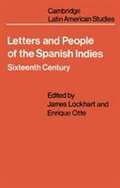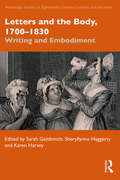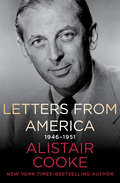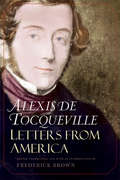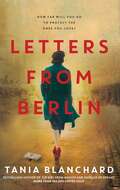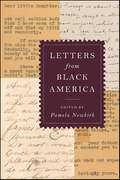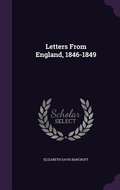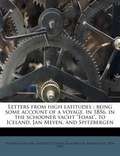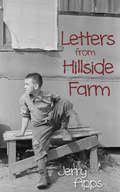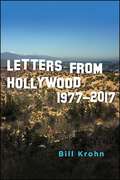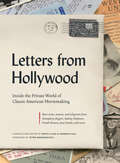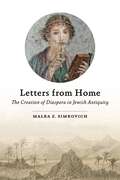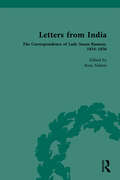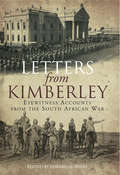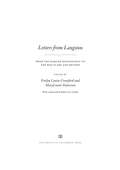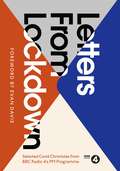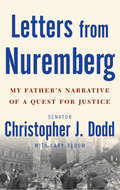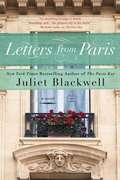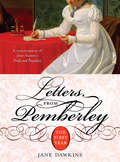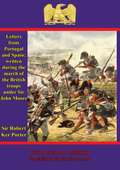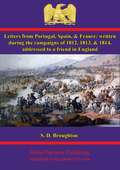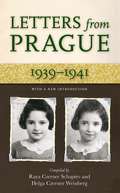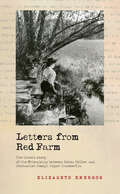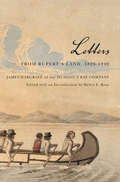- Table View
- List View
Letters and People of the Spanish Indies,: Sixteenth Century (Cambridge Latin American Studies)
by James Lockhart; Enrique OtteThis 1976 book consists of the public and private letters of merchants which present a lively panorama of early life in Spanish-American society.
Letters and the Body, 1700–1830: Writing and Embodiment (Routledge Studies in Eighteenth-Century Cultures and Societies)
by Karen Harvey Sarah Goldsmith Sheryllynne HaggertyThis collection explores the multifaceted relationship between letters and bodies in the long eighteenth century, featuring a broad selection of women's and men’s letters written from and to Britain, North America, Europe, India and the Caribbean, from the labouring poor to the landed elite. In eleven chapters, scholars from various disciplines draw on different methodological approaches that include close readings of single letters, social historical analyses of large corpora and a material culture approach to the object of the letter. This research includes personal letters exchanged among family and friends, formal correspondence and letters that were incorporated into published forewords and appendices, journals and memoirs. Part I explores the letter as a substitute for the absent body, the imagined physical encounters and performances envisaged by letter writers and the means through which these imagined sensations were conveyed. Part II examines the letter as a material object that served as a conduit for descriptions of the material body and as an instrument for embodied encounters. Part III focuses on how correspondents purposefully used their bodies in letters as a means to create intimacy, to generate social networks and build a ‘body politic’. This interdisciplinary volume centred around letters will be of interest to scholars and students in a variety of fields including eighteenth-century studies, cultural history and literature.
Letters from America, 1946–1951: 1946-2004
by Alistair Cooke&“[Cooke is] one of the most gifted and urbane essayists of the century, a supreme master.&” —The Spectator As the voice of the BBC&’s Letter from America for close to six decades, Alistair Cooke addressed several millions of listeners on five continents. They tuned in every Friday evening or Sunday morning to listen to his erudite and entertaining reports on life in the United States. According to Lord Hill of Luton, chairman of the BBC, Cooke had &“a virtuosity approaching genius in talking about America in human terms.&”Letters from America: 1946–1951 contains highlights from the first five years of Alistair Cooke&’s legendary BBC radio program, years when listeners were eager to put the horrors of World War II behind them. Cooke&’s lively and illuminating dispatches from New York perfectly capture the spirit of the times. From the significance of Labor Day to reflections on the changing seasons to the heroic Long Island duck that saved two people from drowning, little escapes the broadcaster&’s sharp reportorial eye and affable wit. This collection includes Cooke&’s historical tour of Washington, DC, and his thoughts on why New York is such a singular city, and covers more serious topics such as the Soviet threat and the anxieties of the atomic age. Always captivating, Cooke treats the reader to profiles of Joe Louis and Will Rogers and reflections on Damon Runyon&’s America, and concludes with a &“Letter to an Intending Immigrant.&”Letters from America: 1946–1951, the first volume of Cooke&’s iconic broadcasts, offers a captivating journey through culture, history, and politics and is a classic of twentieth-century journalism.
Letters from America: Alexis de Tocqueville
by Alexis De Tocqueville Frederick BrownYoung Alexis de Tocqueville arrived in the United States for the first time in May 1831, commissioned by the French government to study the American prison system. For the next nine months he and his companion, Gustave de Beaumont, traveled and observed not only prisons but also the political, economic, and social systems of the early republic. Along the way, they frequently reported back to friends and family members in France. This book presents the first translation of the complete letters Tocqueville wrote during that seminal journey, accompanied by excerpts from Beaumont’s correspondence that provide details or different perspectives on the places, people, and American life and attitudes the travelers encountered. These delightful letters provide an intimate portrait of the complicated, talented Tocqueville, who opened himself without prejudice to the world of Jacksonian America. Moreover, they contain many of the impressions and ideas that served as preliminary sketches for Democracy in America, his classic account of the American democratic system that remains an important reference work to this day. Accessible, witty, and charming, the letters Tocqueville penned while in America are of major interest to general readers, scholars, and students alike.
Letters from Berlin: The Girl From Munich, Suitcase Of Dreams, Letters From Berlin
by Tania BlanchardFrom the bestselling author of The Girl from Munich and Suitcase of Dreams comes an unforgettable tale of love, courage and betrayal inspired by a true story Berlin, 1943 As the Allied forces edge closer, the Third Reich tightens its grip on its people. For eighteen-year-old Susanna Göttmann, this means her beloved adopted family including the man she loves, Leo, are at risk. His mother – Susie&’s godmother – is forced to register as a Jew and wear the Star of David, bearing the resentment of the village she has always called home. Desperate to protect them any way she can, Susie accepts the help of an influential Nazi officer. It means she must abandon any hope of a future with Leo and enter the terrifying world of the Nazi elite. But all is not lost as her newfound position offers more than she could have hoped for … With critical intelligence at her fingertips, Susie seizes a dangerous opportunity to help the resistance. The decisions she makes could change the course of the war, but what will they mean for her family and her future?Praise for Tania Blanchard &‘Packs an emotional punch that will reverberate far and wide&’ Weekly Times &‘Captures the intensity of a brutal and unforgiving war, successfully weaving love, loss, desperation and, finally, hope into a gripping journey of self-discovery&’ Courier Mail &‘A tumultuous journey from order to bedlam, and from naive acceptance of the status quo to the gradual getting of political wisdom&’ Sunday Age &‘Combining historical tragedy, romance, and true stories … Superb and enriching&’ Better Reading
Letters from Black America
by Pamela NewkirkLetters from Black America fills a literary and historical void by presenting the pantheon of African American experience in the most intimate way possible—through the heartfelt correspondence of the men and women who lived through monumental changes and pivotal events, from the 1700s to the twenty-first century, from slavery to the war in Iraq. The first-ever narrative history of African Americans told through their own letters, this book includes the thoughts of politicians, writers, and entertainers, as well as those of slaves, servicemen, and domestic workers. From a slave who writes to his wife on the eve of being sold to famous documents like Martin Luther King, Jr.'s "Letter from Birmingham Jail," these writings illuminate struggles and triumphs, hardships and glory, in the unforgettable words of the participants themselves. Letters from Black America is an indispensable addition to our country's literary tradition, historical understanding, and self-knowledge.
Letters from England, 1846-1849
by Elizabeth Davis BancroftElizabeth Davis Bancroft (1803 - 1886) was born in Plymouth,Massachusetts. She was the wife of the famous American historian and statesman George Bancroft (1800 - 1891). Bancroft is most famous for the letters she wrote to family members from England. Though these letters were not intended for publication, because of the exuberance and the clarity of Bancroft’s depiction of Victorian social life in London, they were published as Letters from England (1846 - 1849).
Letters from Hillside Farm
by Jerry AppsTold through the correspondence between the young narrator and his grandmother, Letters from Hillside Farm, provides a glimpse of life during the Great Depression of the 1930's. Young George moves from Cleveland, Ohio to a farm in Wisconsin. He shares his discovery of rural life and the realities of tough times with his Grandmother Strunkmeyer.
Letters from Hollywood: 1977-2017 (SUNY series, Horizons of Cinema)
by Bill KrohnJournalist and filmmaker Bill Krohn has been the Los Angeles correspondent for the French magazine Cahiers du cinéma for over forty years. Letters from Hollywood brings together thirty-four of his essays, many of them appearing in English for the first time. Focusing most pieces on a particular director and film, Krohn uses his inside knowledge of the studio system to illuminate an art that is also a multibillion-dollar business. He connects currents in French film criticism and theory with an unfolding account of American cinema past and present, offering penetrating insights into directors and their work. Beginning with Allan Dwan, who learned how to make movies before Hollywood was born by watching D. W. Griffith, Krohn presents a panorama that encompasses Alfred Hitchcock and Woody Allen, Stanley Kubrick and Sergio Leone, Star Wars and I Love Lucy. He covers everything from gangsters to gremlins, from blockbusters to no-budget cult films like Moon Over Harlem and Plan 9 from Outer Space, in a style that is accessible to anyone who loves movies, or has a passion for writing about them.
Letters from Hollywood: Inside the Private World of Classic American Moviemaking
by Rocky Lang; Barbara HallRare correspondence from Humphrey Bogart, Audrey Hepburn, Frank Sinatra, Jane Fonda, and other Hollywood luminaries from the silent film era to the 1970s. Letters from Hollywood reproduces in full color scores of entertaining and insightful pieces of correspondence from some of the most notable and talented film industry names of all time—from the silent era to the golden age, and up through the pre-email days of the 1970s. Culled from libraries, archives, and personal collections, the 135 letters, memos, and telegrams are organized chronologically and are annotated by the authors to provide backstories and further context. While each piece reveals a specific moment in time, taken together, the letters convey a bigger picture of Hollywood history. Contributors include celebrities like Greta Garbo, Alfred Hitchcock, Humphrey Bogart, Frank Sinatra, Katharine Hepburn, Marlon Brando, Elia Kazan, Cary Grant, Francis Ford Coppola, Tom Hanks, and Jane Fonda. This is the gift book of the season for fans of classic Hollywood.With a foreword by Peter Bogdanovitch.“This is, quite simply, one of the finest books I’ve ever read about Hollywood.” —Leonard Maltin
Letters from Home: The Creation of Diaspora in Jewish Antiquity
by Malka Z. SimkovichThe announcement by the Persian king Cyrus following his conquest of Babylon in 539 BCE that exiled Judahites could return to their homeland should have been cause for celebration. Instead, it plunged them into animated debate. Only a small community returned and participated in the construction of the Second Temple in Jerusalem. By the end of the sixth century BCE, they faced a theological conundrum: Had the catastrophic punishment of exile, understood as marking God’s retribution for the people’s sins, come to an end?By the Hellenistic era, most Jews living in their homeland believed that life abroad signified God’s wrath and rejection. Jews living outside of their homeland, however, rejected this notion. From both sides of the diasporic line, Jews wrote letters and speeches that conveyed the sense that their positions had ancient roots in Torah traditions. In this book, Malka Z. Simkovich investigates the rhetorical strategies—such as pseudepigraphy, ventriloquy, and mirroring—that Egyptian and Judean Jews incorporated into their writings about life outside the land of Israel, charting the boundary-marking push and pull that took place within Jewish letters in the Hellenistic era. Drawing on this correspondence and other contemporaneous writings, Simkovich argues that the construction of diaspora during this period—reinforced by some and negated by others—produced a tension that lay at the core of Jewish identity in the ancient world. This book is essential reading for scholars and students of ancient Judaism and to laypersons interested in the questions of a Jewish homeland and Jewish diaspora.
Letters from India: The Correspondence of Lady Susan Ramsay, 1854–1856
by Ross NelsonThis fascinating volume reproduces the letters and journal of Lady Susan Ramsay (1837-1898), the elder daughter of the Marquess of Dalhousie, Governor-General of India from 1848 to 1856. The correspondence was written over a two-year period: commencing with Susan’s positive response to her father’s request that she join him in Calcutta, following the death of her mother; and concluding with Susan’s arrival with her father at Southampton. Lady Susan was still only 17 when she arrived in India, and was therefore the youngest person to take up the role of vicereine of India. Her letters and journal represent the unique viewpoint of a highly intelligent, witty, articulate and unprejudiced young woman expressed from locations that range from Osborne on the Isle of Wight to Seringapatam in Mysore. The detail, maturity and inventive quality of her writing invites comparison with that of Emily Eden, Emily Metcalfe, Charlotte Canning and other prominent early Victorian women. Accompanied by extensive introductions and annotations by Ross Nelson, this volume will be of great interest to students and scholars of Imperial History.
Letters from Kimberly: Etewitness Accounts from the South African War
by Edward Spiers'Full of new material, fresh insights and perceptive analysis.' Ian KnightThe defence of Kimberley and the mission to relieve it was one of the great dramatic sagas of the South African War. The actual relief, following a spectacular cavalry charge, represented the first decisive upturn in the fortunes of the British war effort, soon followed by a crushing defeat of the Boers at the battle of Paardeberg. Within Kimberley citizens suffered from dwindling food stocks and enemy shelling, but even more controversial were the tensions that erupted between the siege commander, Lieutenant-Colonel Kekewich, and Kimberley's leading citizen, Cecil Rhodes. In this illuminating new history, Edward Spiers, presents a selection of first-hand accounts of this epic siege. The 260 letters were published originally in British metropolitan and provincial newspapers and they provide crucial insights into the perceptions of civilians caught up in the siege; the desperate and bloody attempts to relieve the town; and the experiences of junior officers and other ranks as they struggled to cope with the demands of modern warfare. Full of human incident, drama and pathos, these fascinating eyewitness testimonies make for compelling reading and add richly to our understanding of the events in Cape Colony.
Letters from Langston
by Langston Hughes Marylouise Patterson Evelyn Louise CrawfordLangston Hughes, one of America's greatest writers, was an innovator of jazz poetry and a leader of the Harlem Renaissance whose poems and plays resonate widely today. Accessible, personal, and inspirational, Hughes's poems portray the African American community in struggle in the context of a turbulent modern United States and a rising black freedom movement. This indispensable volume of letters between Hughes and four leftist confidants sheds vivid light on his life and politics.Letters from Langston begins in 1930 and ends shortly before his death in 1967, providing a window into a unique, self-created world where Hughes lived at ease. This distinctive volume collects the stories of Hughes and his friends in an era of uncertainty and reveals their visions of an idealized world--one without hunger, war, racism, and class oppression.
Letters from Lockdown: A Selection of Covid Chronicles from BBC Radio 4’s PM Programme
by Evan DavisA remarkable collection of 'Covid Chronicles' -- stories from lockdown sent in from listeners to BBC Radio 4 -- making a deeply moving people's history of the pandemic. On 23 March 2020, as the deadly virus spread around the world, the UK went into lockdown. In the following weeks and months, it became clear that in many ways we were all in this together, but the illness and the long period of isolation would hit people in entirely different ways.When BBC Radio 4's PM Programme launched the 'Covid Chronicles' series, listeners from across the country - and beyond - began sending in their lockdown stories to be aired on the show. The results are astonishing: moving, profound, funny, powerful and an invaluable record of our collective experiences. Ranging from the everyday (the thrill of booking a food delivery) to the momentous (a wedding on Zoom), we hear about birth and death, loneliness and loss, community and kindness, as well as remarkable stories from those working in the NHS on the front line.This book is a collection of some of these Chronicles, written in the midst of one of the most unexpected and intense moments in our history. Together they give us an unforgettable portrait of ordinary people caught in extraordinary times, with all the humour and tragedy and uncertainty we've been through. 'It's inspiring that so many people have shared their stories - some everyday, some life-changing, but all very human. This is a wonderful collection of experiences, to record and remember this devastating year' Christie Watson, bestselling author of The Language of Kindness
Letters from Nuremberg: My Father's Narrative of a Quest for Justice
by Christopher J. DoddFor some sixty years, the Nuremberg trials have demonstrated the resolve of the United States and its fellow Allied victors of the Second World War to uphold the principles of dispassionate justice and the rule of law even when cries of vengeance threatened to carry the day. In the summer of 1945, soon after the unconditional surrender of Nazi Germany, Thomas J. Dodd, the father of U.S. Senator Christopher J. Dodd of Connecticut, traveled to the devastated city of Nuremberg to serve as a staff lawyer in this unprecedented trial for crimes against humanity. Thanks to his agile legal mind and especially to his skills at interrogating the defendants--including such notorious figures as Hermann Göring, Alfred Rosenberg, Albert Speer, Joachim von Ribbentrop, and Rudolf Hess--he quickly rose to become the number two prosecutor in the U. S. contingent. Over the course of fifteen months, Dodd described his efforts and his impressions of the proceedings in nightly letters to his wife, Grace. The letters remained in the Dodd family archives, unexamined, for decades. When Christopher Dodd, who followed his father's path to the Senate, sat down to read the letters, he was overwhelmed by their intimacy, by the love story they unveil, by their power to paint vivid portraits of the accused war criminals, and by their insights into the historical importance of the trials. Along with Christopher Dodd's reflections on his father's life and career, and on the inspiration that good people across the world have long taken from the event that unfolded in the courtroom at Nuremberg, where justice proved to be stronger than the most unspeakable evil, these letters give us a fresh, personal, and often unique perspective on a true turning point in the history of our time. In today's world, with new global threats once again putting our ideals to the test, Letters from Nuremberg reminds us that fear and retribution are not the only bases for confrontation. As Christopher Dodd says here, "Now, as in the era of Nuremberg, this nation should never tailor its eternal principles to the conflict of the moment, for if we do so, we will be shadowing those we seek to overcome."
Letters from Paris
by Juliet BlackwellFrom the New York Times bestselling author of The Paris Key comes the story of a mysterious work of art and the woman inspired to uncover its history in the City of Light.After surviving the accident that took her mother's life, Claire Broussard has worked hard to escape her small Louisiana hometown. But these days she feels something is lacking. Abruptly leaving her lucrative job in Chicago, Claire returns home to care for her ailing grandmother. There, she unearths a beautiful piece of artwork that her great-grandfather sent home from Paris after World War II. At her grandmother's urging, Claire travels to Paris to track down the century-old mask-making atelier where the object, known only as "L'Inconnue"--or The Unknown Woman--was created. Under the watchful eye of a surly mask-maker, Claire discovers a cache of letters that offers insight into the life of the Belle Epoque woman immortalized in the work of art. As Claire explores the unknown woman's tragic fate, she begins to unravel deeply buried secrets in her own life.From the Trade Paperback edition.
Letters from Pemberley
by Jane DawkinsIn this continuation of Jane Austen's Pride and Prejudice, one of the best-loved novels in the English language, Elizabeth Bennet finds herself in a very different league of wealth and privilege, now as Mrs. Fitzwilliam Darcy and mistress of Pemberley. Writing to her sister, Jane, she confides her uncertainty and anxieties, and describes the everyday of her new life. Her first year at Pemberley is sometimes bewildering, but Lizzy's spirited sense of humor and satirical eye never desert her. Incorporating Jane Austen's own words and characters from her other works, the book is a literary patchwork quilt piecing together the story of Lizzy's first eventful year as Mrs. Darcy.
Letters from Portugal and Spain: Written During The March Of The British Troops Under Sir John Moore
by Sir Rober Ker PorterSir Robert Ker Porter's life was as varied and dramatic as his paintings. A noted author, artist, soldier and diplomat, he was born into a military family in Durham. After developing a reputation for his painting, he travelled extensively in Northern Europe, before accepting commissions for historical paintings from the Tzar of Russia in 1805. He travelled on to Sweden where he met Sir John Moore. Sir John found him congenial company and invited him to accompany the expedition to Spain that he was to lead. Sir John's campaign in 1808 was to be brief, outnumbered by his French opponents by massive odds, and with the weight of British and Spanish hopes encumbering him, he opted for a bold thrust at an isolated French corps under Soult. The British troops were discovered on their approach march and, despite a number of successful small engagements, the imminent danger of the other French corps rushing to surround the small body of British men was obvious to Moore. His only choice was to retreat through some of the roughest country in Europe: through the crags, ravines and gorges on Northern Spain. Fending off successive French attacks, dealing with drunken starving soldiers, and rapidly diminishing supplies, Sir John drove his men on to Coruña, where he fought a sterling defensive battle to ensure that his men could be carried off by the Royal Navy.Sir Robert Porter's work illustrates the hardships and difficulties men and officers of the British force with all of the eye for detail that an artist can summon. His letters are one of the prime sources for the campaign of 1808.Author -- Porter, Robert Ker, Sir, 1777-1842.Text taken, whole and complete, from the edition published in London: Longman, Hurst, Rees, and Orme, 1809 Original Page Count - xiv, 320 p.Illustrations -- 7 engravings.
Letters from Portugal, Spain, & France: Written During The Campaigns Of 1812, 1813, And 1814
by S. D. BroughtonAfter studying at St. George's Hospital, the author was appointed assistant surgeon of the 2nd Life Guards and placed in charge of the service squadron's that were to be posted to the Peninsular in 1812. His life in the army was to be much different from the sinecure of London life and his account book presents a very personal view of his campaigning experiences on the march from Lisbon to Boulogne during the Peninsular War against Napoleonic France. The letters contain fascinating details not often found in memoirs concerning this campaign, including descriptions of the local diet and portrayals of contemporary society, festivals, and customs, as well as recording the particulars of the military actions in which the author was engaged. From the balls and dinner-parties in Lisbon via the discomforts of campaign to the splendours of Paris, this is an engaging and elegant narrative of a tumultuous period in European history.Author --S. D. Broughton (1787-1837)Text taken, whole and complete, from the edition published in London: Longman, Hurst, Rees, Orme, and Brown, 1815.Original Page Count - vi and 412 pages.
Letters from Prague: 1939–1941
by Helga Weinberg Raya C SchapiroCorrespondence documenting a Jewish family&’s personal history of the Holocaust and World War II. Raya Schapiro and Helga Weinberg found a box of letters among their mother&’s effects after her death in 1990. They were written by their grandmother and uncle, trapped in Prague after the Nazi occupation, to the girls&’ parents who had escaped to the United States in May, 1939, leaving behind Raya and Helga, who were five and seven years old at the time. The seventy-seven letters reprinted here span a period of two years, during which the Nazis drew an ever-tightening noose of destruction around the Jews of Prague: each letter is followed by notes of explanation and amplification, as well as notes on Nazi laws and official restrictions and the progress of the war. Each letter has a censor&’s stamp on it; each envelope bears the still-frightening emblem of the Third Reich. The letters dramatically convey the tension, growing daily, of existence under the Nazis, and their tone becomes increasingly desperate as every avenue of escape reaches a dead end. Praise forLetters from Prague: 1939–1941&“This book turns an abstraction into a palpable terror and pity.&” —Chicago Tribune&“A compelling and personal insight into the horrors of the Holocaust.&” —Booklist&“As it turned out, the girls escaped only after months of bureaucratic wrangling, while the grandmother and uncle never obtained permission to leave and were deported to the gas chambers at Treblinka and Auschwitz two years later. Collected here is the moving correspondence between the adults in Prague and the girls&’ parents in the U.S.&” —Publishers Weekly
Letters from Red Farm: The Untold Story of the Friendship between Helen Keller and Journalist Joseph Edgar Chamberlin
by Elizabeth EmersonIn 1888, young Helen Keller traveled to Boston with her teacher, Annie Sullivan, where they met a man who would change her life: Boston Transcript columnist and editor Joseph Edgar Chamberlin. Throughout her childhood and young adult years, Keller spent weekends and holidays at Red Farm, the Chamberlins' home in Wrentham, Massachusetts, a bustling environment where avant-garde writers, intellectuals, and social reformers of the day congregated. Keller eventually called Red Farm home for a year when she was sixteen. Informed by previously unpublished letters and extensive research, Letters from Red Farm explores for the first time Keller's deep and enduring friendship with the man who became her literary mentor and friend for over forty years. Written by Chamberlin's great-great granddaughter, this engaging story imparts new insights into Keller's life and personality, introduces the irresistible Chamberlin to a modern public, and follows Keller's burgeoning interest in social activism, as she took up the causes of disability rights, women's issues, and pacifism.
Letters from Rupert's Land, 1826-1840
by Helen Ross James HargraveA prodigious letter writer, Hargrave saved drafts of his business and personal correspondence in letterbooks. He wrote to family and friends settled in Beauharnois County on the south shore of the St Lawrence and in the Tweed valley in Scotland, as well as to his future wife, Letitia Mactavish, and members of her fur-trading family in Argyllshire on Scotland's west coast. His letters document the experiences of a "lowland" Scottish family in North America, as well as happenings at the administrative centre of the Hudson's Bay Company fur trade. He expresses his views on religion, history, politics, and literature, describes his romantic attachments, and makes clear his attitudes towards the company's Native partners in the fur trade.
Letters from Rupert's Land, 1826-1840: James Hargrave of the Hudson's Bay Company (Rupert's Land Record Society Series #11)
by Helen Ross James HargraveA prodigious letter writer, Hargrave saved drafts of his business and personal correspondence in letterbooks. He wrote to family and friends settled in Beauharnois County on the south shore of the St Lawrence and in the Tweed valley in Scotland, as well as to his future wife, Letitia Mactavish, and members of her fur-trading family in Argyllshire on Scotland's west coast. His letters document the experiences of a "lowland" Scottish family in North America, as well as happenings at the administrative centre of the Hudson's Bay Company fur trade. He expresses his views on religion, history, politics, and literature, describes his romantic attachments, and makes clear his attitudes towards the company's Native partners in the fur trade.
